Aug . 12, 2025 03:00 Back to list
High-Security Barbed Wire Mesh | Durable Fencing Solutions
Understanding Barbed Wire Mesh: A B2B Perspective on Security and Durability
In the realm of advanced perimeter security and robust agricultural applications, barbed wire mesh stands as a foundational solution. This essential fencing material, known for its deterrent capabilities and structural integrity, is indispensable across numerous industries. Its evolution reflects continuous innovation in material science and manufacturing processes, ensuring enhanced longevity and effectiveness against diverse environmental and security challenges. From safeguarding critical infrastructure to defining property boundaries in agricultural landscapes, the strategic deployment of modern barbed wire fencing systems represents a cornerstone of effective security strategies. This section delves into the critical role and evolving trends of barbed wire, offering insights vital for B2B procurement and engineering professionals.
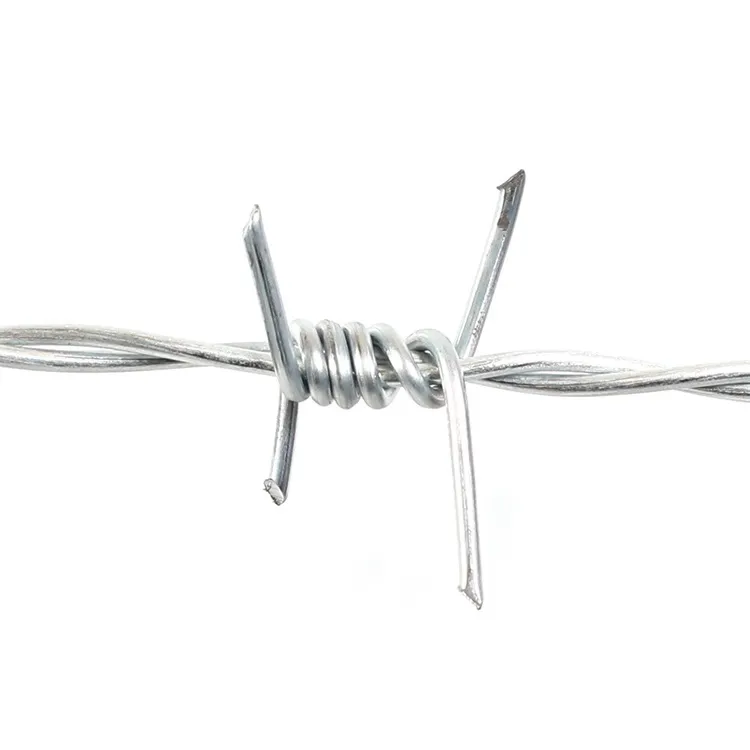
The market for security fencing solutions is experiencing significant growth, driven by increasing global security concerns, infrastructure development, and agricultural expansion. This trend directly impacts the demand for reliable and durable materials like barbed wire mesh. Recent industry reports highlight a steady compound annual growth rate (CAGR) in the global fencing market, with security fencing components playing a crucial role. For instance, projections indicate the global security fencing market is set to reach approximately USD 6.5 billion by 2027, with a substantial portion attributed to high-security wire products. This growth is fueled by stricter regulatory requirements for industrial facilities, expanded agricultural operations requiring robust containment, and urban development initiatives demanding enhanced property protection. Understanding these market dynamics is key for strategic sourcing and product development in the B2B sector.
Precision Manufacturing: The Barbed Wire Process and Quality Standards
The production of high-quality barbed wire mesh is a sophisticated industrial process, beginning with the selection of premium raw materials. Typically, low-carbon steel wire, known for its malleability and strength, is used, often specified to standards like ASTM A641 for galvanized coatings or ASTM A121 for barbed wire itself. The manufacturing process primarily involves wire drawing, where steel rods are pulled through dies to achieve precise wire gauges, ensuring uniformity and tensile strength. Following this, the drawn wire undergoes galvanization, a crucial step for corrosion resistance. Hot-dip galvanizing, conforming to ISO 1461 or ASTM A123 standards, involves immersing the wire in molten zinc, creating a metallurgical bond that offers superior protection against rust and environmental degradation, significantly extending the product's service life.
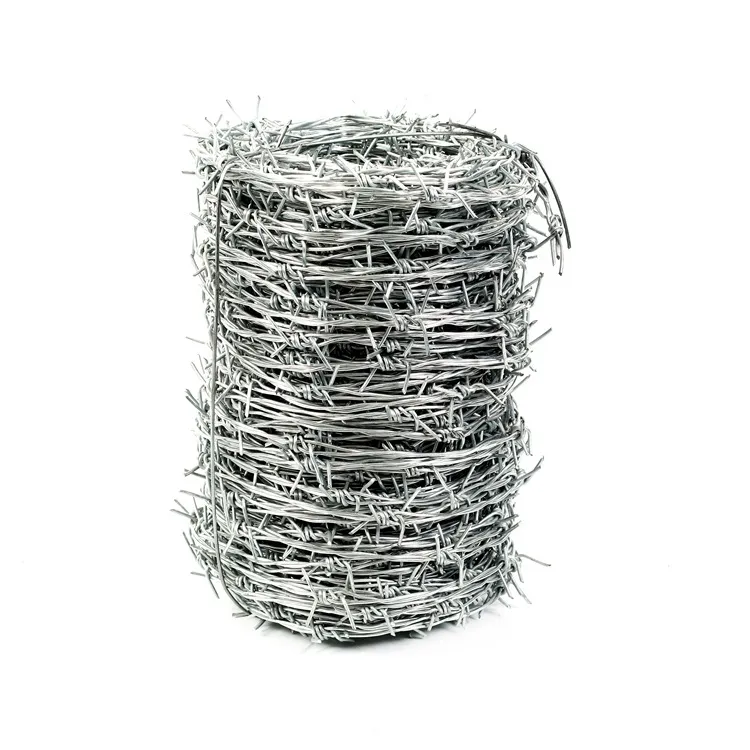
Subsequent to galvanization, the wire is fed into specialized machines that precisely twist two or more line wires together, simultaneously adding the barbs at predetermined intervals. The barbs themselves are typically cut from shorter pieces of wire and then crimped onto the line wires, forming a sharp, deterrent point. Consistency in barb spacing, wire tension, and barb sharpness is critical for performance and security. Throughout this entire production chain, rigorous quality control measures are implemented. This includes continuous monitoring of wire diameter, zinc coating thickness using magnetic or eddy current gauges, and destructive tensile strength testing to ensure the wire meets specified load-bearing capacities. Adherence to international standards like ISO 9001 for quality management and ISO 14001 for environmental management ensures a consistent, high-grade product suitable for demanding industrial and commercial applications, including in sectors like petrochemicals, mining, and public utilities where longevity and resistance to harsh conditions are paramount.
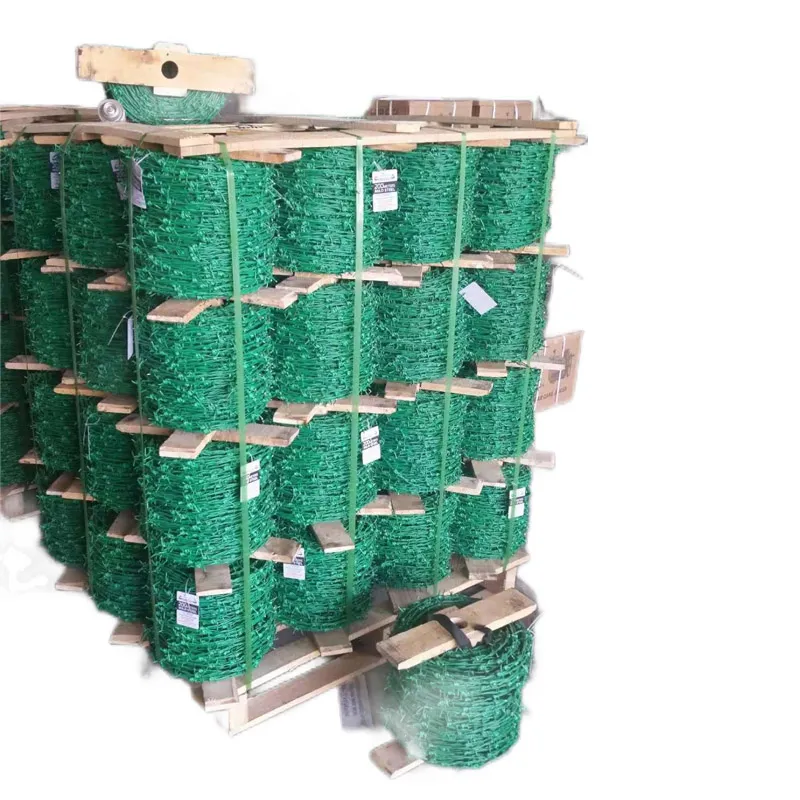
Technical Specifications and Performance Metrics
Understanding the technical parameters of barbed wire mesh is crucial for effective deployment in diverse applications. These specifications directly influence the product's security efficacy, durability, and cost-effectiveness. Key parameters include wire gauge, which dictates the wire's thickness and strength; barb spacing, affecting the deterrent density; and the type and thickness of the protective coating. For instance, a heavier gauge wire (lower gauge number, e.g., 12.5 gauge) offers superior resistance to cutting and bending compared to a lighter gauge (e.g., 14 gauge), making it ideal for high-security perimeters. Zinc coating mass, measured in grams per square meter (g/m²), directly correlates with corrosion resistance and expected service life, which can range from 15 to 30 years depending on environmental conditions and coating quality.
| Parameter | Description | Common Range/Value |
|---|---|---|
| Wire Gauge (Diameter) | Measure of wire thickness, inverse to strength (lower gauge = thicker wire) | 12.5 Gauge (2.5mm) to 14 Gauge (2.0mm) |
| Barb Spacing | Distance between barbed clusters on the line wire | 75mm (3 inches) to 150mm (6 inches) |
| Number of Barbs | Number of points on each barb cluster | 2-point or 4-point barbs |
| Strand Type | Number of twisted wires forming the main line | Single strand or Double strand (most common) |
| Material | Base metal used for the wire | Low Carbon Steel (Q195, Q235) |
| Coating Type | Protective layer against corrosion | Electro Galvanized, Hot-Dip Galvanized, PVC Coated |
| Tensile Strength | Maximum stress the wire can withstand before breaking | 350-550 N/mm² (for line wire) |
| Roll Length | Standard packaging length of coiled wire | 50m, 100m, 200m, 250m, 500m |
The performance of barbed wire mesh is also defined by its resistance to environmental factors. For coastal or highly corrosive industrial environments, a heavy hot-dip galvanized coating combined with a PVC coating offers the best protection, significantly extending its operational life. For instance, a Class 3 hot-dip galvanized coating (meeting ASTM A121 standards for zinc coating weight) typically provides 20+ years of service life in moderate conditions, whereas a Class 1 coating might only last 5-10 years. Understanding these nuanced specifications ensures that the chosen product not only meets security requirements but also offers optimal return on investment through reduced maintenance and replacement cycles.
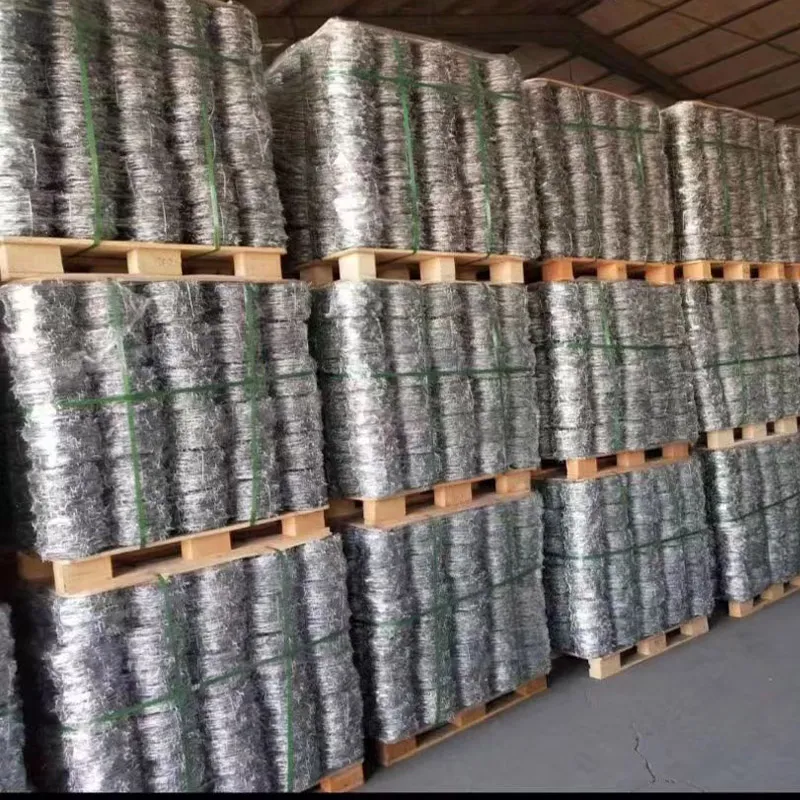
Versatile Applications and Strategic Advantages
The adaptability of barbed wire mesh makes it a preferred choice across a spectrum of industrial and commercial applications. Its primary function as a robust perimeter barrier is widely utilized in sectors requiring stringent access control, such as military bases, correctional facilities, power plants, and industrial complexes. Here, it often complements chain link fences or razor wire installations to create multi-layered security zones. Beyond high-security environments, barbed wire is integral to agricultural fencing, providing effective containment for livestock and deterring trespassers from farmlands. Its simple yet effective design makes it a staple for defining property lines, protecting orchards, and securing remote rural properties.
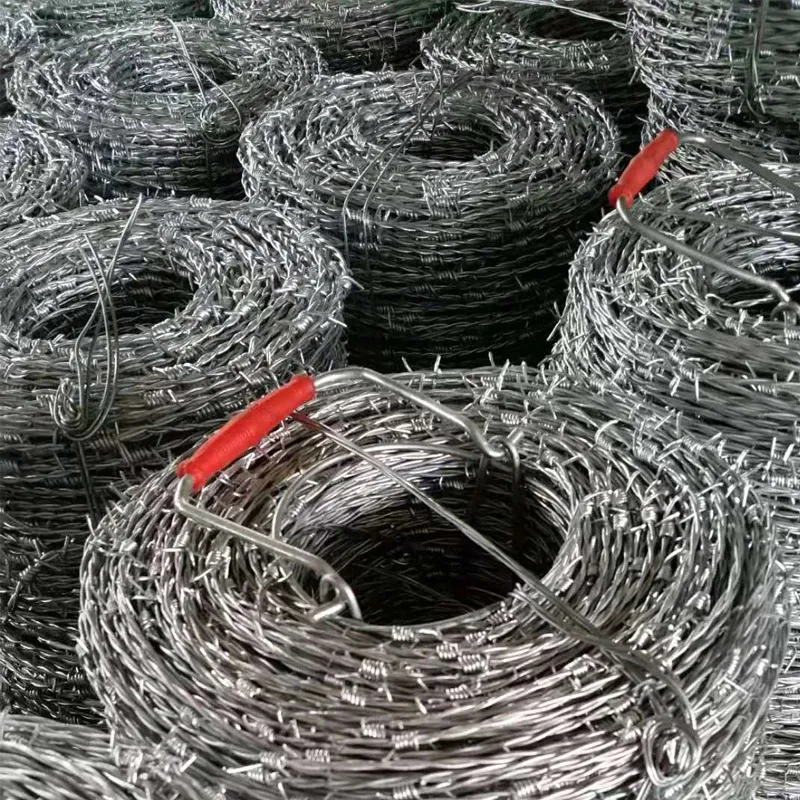
The technical advantages of incorporating barbed wire mesh into fencing systems are numerous. Firstly, its inherent design provides a significant psychological and physical deterrent, making unauthorized entry difficult and time-consuming. Secondly, modern manufacturing techniques ensure superior corrosion resistance through advanced galvanization or PVC coating, significantly extending the product's lifespan even in harsh environmental conditions. This durability translates into lower lifecycle costs and reduced maintenance overheads for businesses. Thirdly, its relatively low cost compared to other high-security fencing options, combined with ease of installation and versatility in configuration (e.g., top lines on chain link, stand-alone agricultural fences), makes it a highly economical and efficient security solution. Real-world application cases demonstrate its effectiveness; for example, a large-scale solar farm in a semi-arid region utilized heavy-gauge hot-dip galvanized barbed wire mesh as its primary perimeter, reporting minimal breaches and excellent long-term performance over a five-year period, effectively showcasing its anti-corrosion properties and robustness.
Customization, Manufacturer Expertise, and Customer Support
For B2B clients, the ability to procure customized barbed wire mesh solutions is often paramount. Leading manufacturers understand that one size does not fit all. Customization options extend to wire gauge, barb configuration (e.g., 2-point vs. 4-point, barb spacing), coating type (different zinc coating classes, PVC colors), and roll length to perfectly match project-specific requirements. For instance, a client securing a sensitive data center might require a heavier gauge wire with closer barb spacing and a high-security coating, while a vineyard might opt for a lighter gauge with wider spacing. Collaboration with a manufacturer that possesses deep technical expertise and offers comprehensive pre-sales consultation ensures that the optimal product specification is identified, aligning performance with budget.
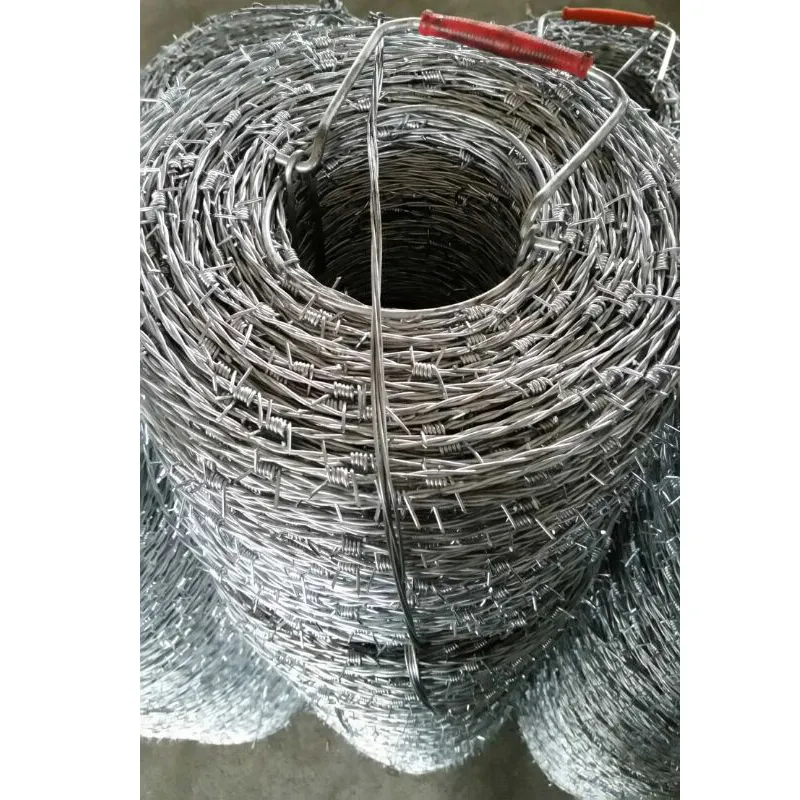
Choosing the right manufacturer is as crucial as selecting the right product. Reputable suppliers often demonstrate their authority through long-standing industry presence, adherence to international quality certifications like ISO 9001:2015, and a portfolio of successful large-scale projects. They provide transparent technical documentation, test certificates, and often offer factory audits to prospective clients. Beyond product quality, trustworthiness is built through robust customer support, including clear communication on delivery lead times (typically 2-4 weeks for standard orders, with expedited options for urgent needs), comprehensive warranty policies (e.g., 10-20 years for corrosion resistance on galvanized products), and responsive after-sales service. A dedicated FAQ section on product selection, installation best practices, and maintenance tips further enhances client confidence, ensuring a seamless procurement experience and long-term satisfaction with the barbed fencing wire solution.
Frequently Asked Questions (FAQ)
Q: What is the primary difference between galvanized and PVC coated barbed wire?
A: Galvanized barbed wire is steel wire coated with zinc to prevent rust, offering excellent corrosion resistance. PVC coated barbed wire has an additional layer of polyvinyl chloride over the galvanized wire, providing superior protection against harsh chemicals, UV rays, and extreme weather, and also allows for color customization to blend with the environment. PVC coating significantly extends the lifespan in highly corrosive or aesthetic-sensitive applications.
Q: How do I determine the appropriate wire gauge for my project?
A: The wire gauge (thickness) depends on the required security level and application. Lower gauge numbers (e.g., 12.5 gauge) indicate thicker, stronger wire suitable for high-security areas, industrial facilities, or heavy livestock containment. Higher gauge numbers (e.g., 14 gauge) are thinner, lighter, and more economical, commonly used for general agricultural fencing or property demarcation. Consult with our technical team to match the gauge to your specific load and security demands.
Q: What is the typical lead time for a bulk order of barbed fencing wire?
A: Standard lead times for bulk orders typically range from 2 to 4 weeks, depending on order volume, customization requirements, and current production schedules. We strive to provide accurate delivery estimates upon order confirmation and offer expedited services for urgent projects. Our logistics team works diligently to ensure timely and efficient delivery to your specified location.
Q: What kind of warranty is offered on your barbed wire products?
A: Our barbed wire products, especially those with advanced galvanization or PVC coatings, come with a robust warranty covering defects in materials and workmanship, and significant corrosion. Specific warranty periods vary by product type and coating, typically ranging from 10 to 20 years for corrosion resistance under normal conditions. Detailed warranty terms are provided with each quotation and product specification. Our commitment is to ensure the long-term performance and reliability of our fencing solutions.
References
- ASTM International. (2020). ASTM A641/A641M-20, Standard Specification for Zinc-Coated (Galvanized) Carbon Steel Wire.
- ASTM International. (2018). ASTM A121-18, Standard Specification for Metallic-Coated Carbon Steel Barbed Wire.
- International Organization for Standardization. (2019). ISO 9001:2015, Quality management systems — Requirements.
- International Organization for Standardization. (2009). ISO 1461:2009, Hot-dip galvanized coatings on fabricated iron and steel articles — Specifications and test methods.
- Grand View Research. (2022). Security Fencing Market Size, Share & Trends Analysis Report.
-
Pre Cut Wire - Straightened, Deburred, Custom Lengths
NewsNov.17,2025
-
Binding Wire for Sale - Durable, Rust-Resistant, Bulk Deals
NewsNov.17,2025
-
Field Fencing for Horses – Safe, Durable, Easy Install
NewsNov.17,2025
-
Euro Fence Factory: Durable, Custom Euro Style Fences
NewsNov.17,2025
-
Euro Fence Factory: Durable OEM Panels, Direct Pricing
NewsNov.17,2025
-
Chain Link Fence Suppliers | Galvanized, Factory-Direct
NewsNov.11,2025









